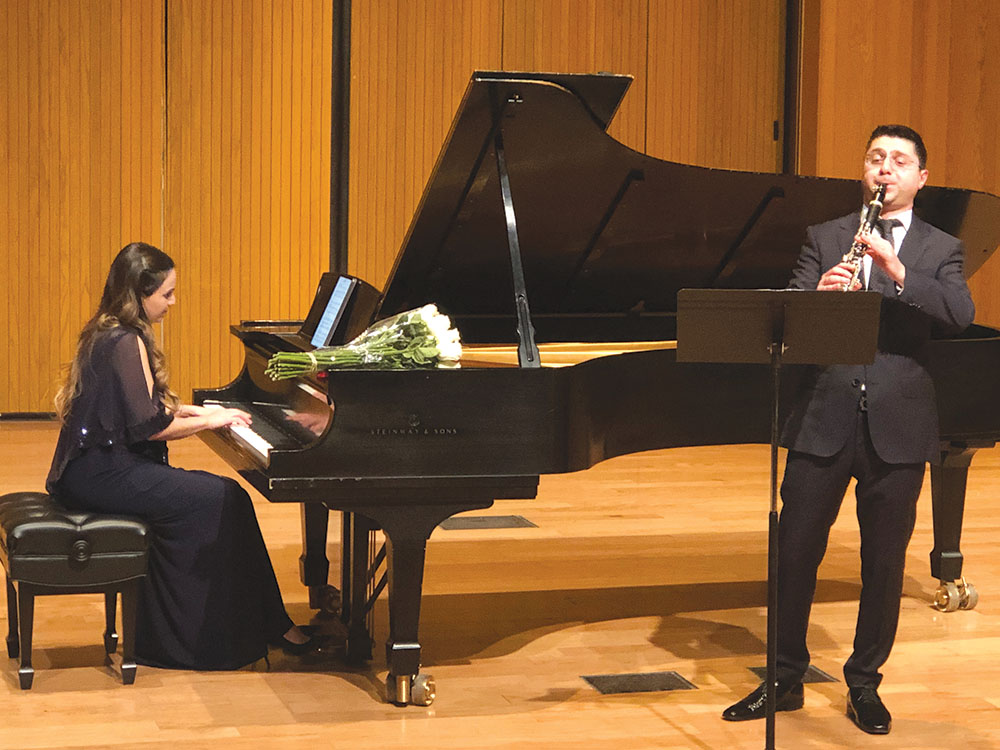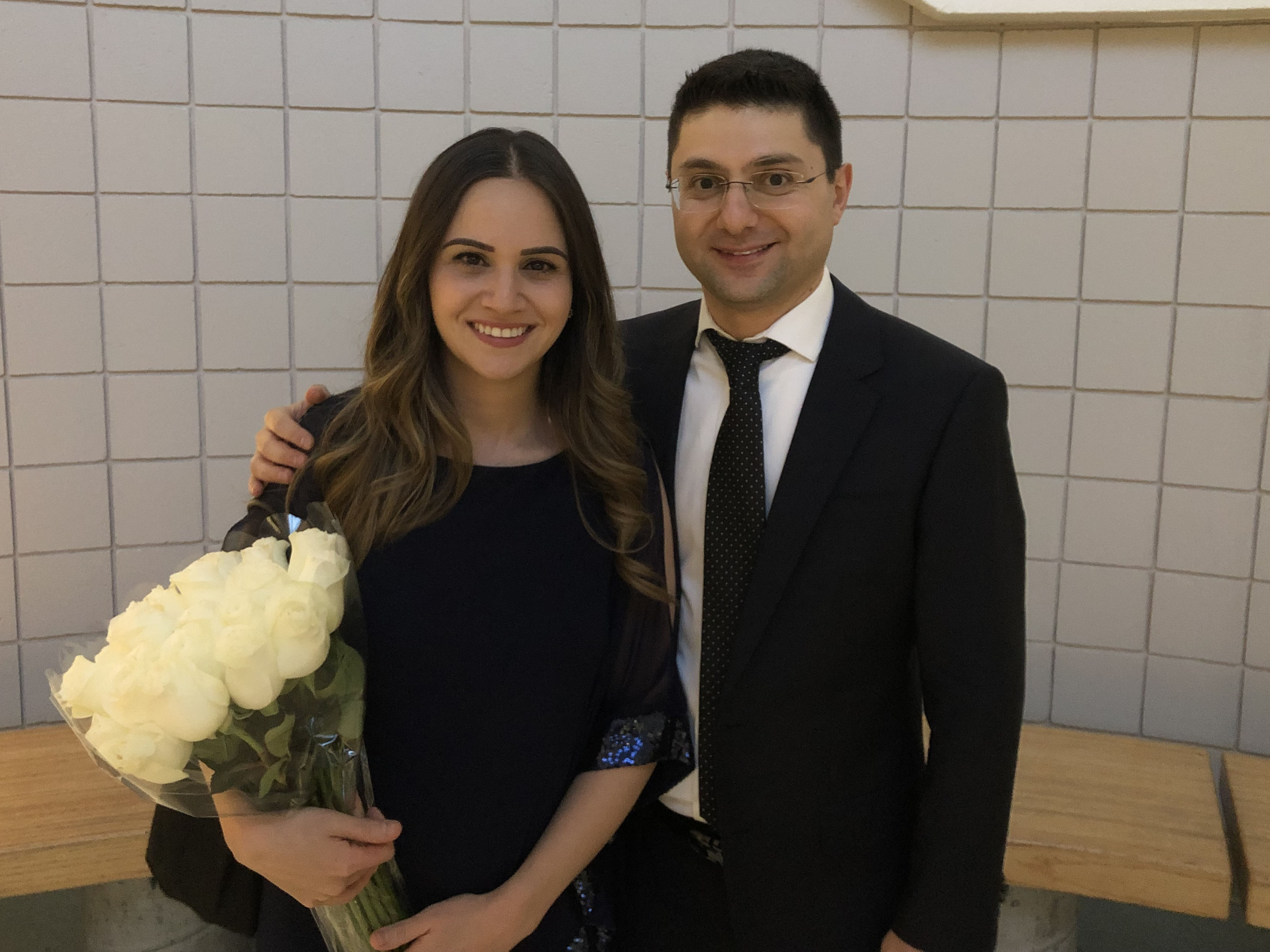
Photo: Barlow Der Mugrdechian
Christine Pambukyan
Staff Writer
“Thank you to everyone for coming to our concert. It is our first time in Fresno, and the audience is great so far,” said Boris Allakhverdyan after performing his first piece.
On Saturday, April 2, 2022, clarinetist Boris Alkakhverdyan and his wife Alin Allakhverdyan performed as part of the “Celebration of Clarinet Featuring Boris Allakhverdyan & Alin Allakhverdyan Piano Concert” held at the Fresno State Concert Hall. The Armenian Studies Program at Fresno State was a co-sponsor of the event.
The concert was held as part of the “Celebrating 35 Years of Clarinet” activities at Fresno State, organized by Fresno State Music Professor Miles M. Ishigaki, which included lecture performances, presentations, masterclasses, and concerts by Allakhverdyan and by Ricardo Morales, Principal Clarinet of the Philadelphia Orchestra.
Boris Allahverdyan was appointed as Principal Clarinet of Los Angeles Philharmonic in 2016 and served previously as the Principal Clarinet in the Metropolitan Opera Orchestra. He is a founding member of the Prima Trio, a grand prize and gold medal winner of the 2007 Fischoff National Chamber music competition, and has appeared as a soloist throughout the United States, Canada, Russia, and Armenia.
Alin Allakhverdyan, is a prize-winning pianist who began her piano studies at the age of four in Southern California. Currently a music director of the American Contemporary Gallery, she collaborates with dancers and musicians in contemporary and classical pieces, and has collaborated with many renowned musicians.
“Three Preludes,” by George Gershwin, was originally a piece written for the piano, but was arranged into a duet for the concert. The first movement was slow and the second had a more sultry and jazzy feeling. The third movement was fast and intense. The second piece, “Nocturne,” by Pyotr Ilyich Tchaikovsky, was originally written for solo pianist and orchestra, but was arranged for the concert for clarinet and piano. This piece began passionate and slow, and progressed into a quick, but still passionate melody; ending in a slower melody.
 The third song, “Denneriana,” by Andre Bloch, was a piece from California that is very popular in Europe, but not as popular in the United States. “It is a nice clarinet piece that was written in 1936,” explained Allakhverdyan. The staccato-filled piece was indeed nice and mesmerizing. The fourth song, “Carmen Fantasy,” by Alexander Rosenblatt, was a jazzy interpretation of Alin’s favorite opera, “Carmen.” The piece began slow and serious, then was jovial and exciting, then slow and passionate, and finally quick yet mysterious.
The third song, “Denneriana,” by Andre Bloch, was a piece from California that is very popular in Europe, but not as popular in the United States. “It is a nice clarinet piece that was written in 1936,” explained Allakhverdyan. The staccato-filled piece was indeed nice and mesmerizing. The fourth song, “Carmen Fantasy,” by Alexander Rosenblatt, was a jazzy interpretation of Alin’s favorite opera, “Carmen.” The piece began slow and serious, then was jovial and exciting, then slow and passionate, and finally quick yet mysterious.
“Vals Venezolano,” by Paquito D’Rivera, was Boris Allakhverdyan’s favorite, as the composer of the piece is his inspiration. During this piece, the clarinet sounded as if it was an accordion and made the audience feel as if they would like to dance. The clarinetist was smiling as he played, making the piece that much more enjoyable to listen to.
“When putting together this repertoire, we thought, since we are playing as a duo, why not play a classic duet,” explained Allakhverdyan, before they played their final piece. This song, “Shalom-Aleichem,” by Bela Kovacs, began with a peaceful and graceful movement that developed into a quick and dance-like melody.
Throughout the concert, the musicians smiled at each other and made a connection with the audience. With each piece Boris Allakhverdyan moved his whole body while playing and Alin seemed to feel every note as she played, closing her eyes with passion as her fingers effortlessly graced the keys. She leaned forward when the music was louder and serious, and she would back away as the sound became quieter.
As the last notes receded in the Concert Hall, the audience cheered and applauded as they gave the duet a standing ovation. The audience would not stop their applause until the couple agreed to play an encore, after which the couple received yet another standing ovation.
 Hye Sharzhoom Armenian Action
Hye Sharzhoom Armenian Action